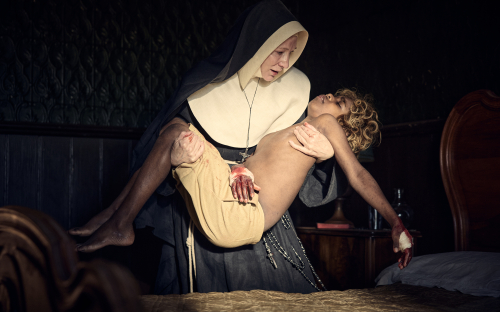
Festival de Cannes
MOVIE REVIEW
The New Boy (2023)
Cate Blanchett became a global superstar so quickly after her movie debut that it’s been a very, very long time since she has played an Australian. Evidently life in lockdown had her reconsider; and she worked closely with writer-director-cinematographer Warwick Thornton to bring “The New Boy” to the screen, starting with the Cannes Film Festival. She is one of its producers, as is her husband Andrew Upton, and their daughter Edith Upton is credited as a “morale officer.” It is a showcase for herself and the 9-year-old Aswan Reid as the new boy, in a parable of religion, duty and how rules for living both create and prevent happiness. It is a strange and sad experience, and unfortunately not imaginative enough to have its desired effect.
The new boy is first seen in the Outback, attempting to murder a white policeman. He fails, is captured in a burlap bag and is dragged across the nation inside that bag, like an animal, to a remote religious community run by a priest named Father John. But the priest is indisposed, so the boy is dumped in the office belonging to Sister Eileen (Ms. Blanchett). Eventually he crawls out from under the table, though Sister Eileen doesn’t look up from her work as she scratches his head. The next morning he sees where he is. There are nine other orphaned boys ranging in age from seven to 14, the oldest of whom is being sent away that very day to work in a factory. It’s 1940; and the war effort needs all hands. The only other adults around the place are the handyman George (Wayne Blair) and the other sister, who tells all the boys to call her Sister Mum (the exceptional Deborah Mailman).
The three of them are kind and cheerful – no oranges and sunshine here – but Sister Eileen is preoccupied with the precarity of the community’s situation; Sister Mum has her hands full with all the daily chores; and George is too worried about losing this excellent living to rock the boat. The boys study, of course, but they mostly work, whether harvesting the olive crop or fighting the bush fires that plague the area. They are just a thrashing group of boys, with no distinct personalities or taste for anything beyond weariness and cruelty, which is an error. The new boy clearly has been brought up in the traditional way; he is barely clothed, speaks no English, doesn’t know how to use the latrine and hunts lizards for food. The women make it their work to integrate him with the community, which includes sleeping in the dormitory with the other boys, although no one cares he prefers to be under the bed instead of in it. Slowly, in observing the others, the new boy starts to adjust, and to communicate. But no one pays him enough attention to see he knows things they can barely imagine; a sparing use of C.G.I. carries this off quite well. Instead the adults are focused on the delivery of an enormous new crucifix for the church which has been sent all the way from Italy. And if you thought the religious metaphors were heavy-handed already, this is where they get going.
For once Ms. Blanchett relies too much on her star power, hitting the usual notes of a struggling white woman relying on alcohol to make her work bearable instead of trusting her colleagues of color, who do the heavy lifting. Mr. Blair and Ms. Mailman do their normal outstanding work – they are stalwarts of Australian cinema who have worked together many times, most notably when Mr. Blair directed Ms. Mailman in cheery crowd-pleaser “The Sapphires” – but they are not the international star who will sell the movie across the world. Young Mr. Reid is a remarkable discovery, self-contained and confident even in this bleak new place, and eager to explore everywhere he finds himself. His intensity and consideration carries the film.
Mr. Thornton films the bleak Australian countryside, all rippling grains and gently rolling hills, with a jaundiced eye. This is not a place of honor, he wants us to know, no matter how hard the sisters work to make it so. But for the movie to truly succeed, Ms. Mailman and Ms. Blanchett should have switched roles. If Ms. Mailman had been the woman risking her beliefs for the greater good, and Ms. Blanchett had been the charming surrogate-parent, the impact of the new boy’s secret would have been devastating and the sisters’ choices an unimaginable betrayal. A more powerful metaphor for Australian history would have been hard to find. As it is, it’s an unsurprising afterthought, which fizzles out immediately upon impact. In revisiting the past we reimagine it, and a bolder choice would have been to use that star power to demand we look at this sorry history with fresh eyes. It’s a shame that coming home didn’t make Ms. Blanchett generous enough to allow someone else the spotlight.
Comments